Rajagopal Muthukumaraswamy (1936-2017) a publisher, librarian, translator and a Tamil scholar. He is also the Managing Director of South India Saiva Siddhanta Works Publishing Society Ltd., (also known as Kazhagam).
Rajagopal Muthukumaraswamy (1936-2017) a publisher, librarian, translator and a Tamil scholar. He is also the Managing Director of South India Saiva Siddhanta Works Publishing Society Ltd., (also known as Kazhagam).
Muthukumaraswamy [1] has been known to Tamil research scholars for more than 6 decades. As a writer he has contributed in translating famous English classics such as Kadathapatta David ( David Copperfield ), Wakefield Pathariyar ( The Vicar of Wakefield ), Karumani Malar ( Black Tulip ), Thayathu (Talisman) by Sir Walter Scott, Sirumi Eithi ( Heidi ) by Johanna Spyri, Indira Priyadharshani & 1008 Commemoration Bibliography. He has also compiled a bibliography of Tamil books jointly with Dr. S. R. Ranganathan, the father of the Library Movement of India.
Born in Chennai, Muthukumaraswamy had his education in Madras. After graduation in 1957 he trained in Library Science. Education: B.A. (Hons) (Tamil Literature) (1957) Pachaiyappa's College, M.A. (1958), D.L.S. (1959), B.Lib.Sc. (1961).
In 1980, he joined as the General Manager of South India Saiva Siddhanta Works Publishing Society Ltd. and was promoted to Managing Director in 1983. Apart from publishing old manuscripts and rare books, the Kazhagam is running a library called Maraimalai Adigal Library which was started in remembrance of Maraimalai Adigal and he started his career as a Librarian from this library. The library is considered important to Tamil Research Scholars. As a librarian he has helped more than 500 scholars to prepare their Thesis for Ph.D., M.Litt., & M.Phil., degree. He showed keen interest in collecting papers related to Tamil and Tamils history & culture. Likewise, few of the collections was utilized to publish a book in 1946 called Madras Presidency Tamil Sangam this is recorded by the author in the book called 'Antinomies of modernity essay' & his work is also recorded in another book called The Province of the Book as, 'The publishing house Saiva Siddhanta Kazhagam, which has a central place in Tamil publishing history. V. Subbiah Pillai and his heir apparent R. Muthukumaraswamy had built this library over the years as the place for Tamil imprints'. [2] Also, he is the editor of the Tamil literary Magazine called SenTamizh Selvi.
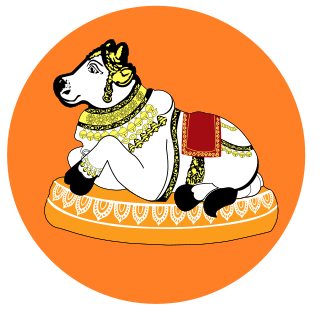
Shaiva Siddhanta is a form of Shaivism popular in a pristine form in South India and Sri Lanka and in a Tantrayana syncretised form in Indonesia propounds a devotional philosophy with the ultimate goal of experiencing union with Shiva. The former draws primarily on the Tamil devotional hymns written by Shaiva saints from the 5th to the 9th century CE, known in their collected form as Tirumurai. Tirumular is considered to be the propounder of the term Siddhanta and its basic tenets. In the 12th century, Aghorasiva, the head of a branch monastery of the Amardaka order in Chidambaram, took up the task of formulating Shaiva Siddhanta. This is an earliest known Aghora Paddhati system of Shaiva Siddhanta of Adi Shaivas mathas in Kongu Nadu. Meykandar was the first systematic philosopher of the school.
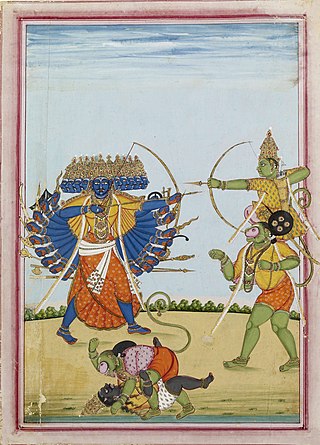
The Ramavataram, popularly referred to as Kamba Ramayanam, is a Tamil epic that was written by the Tamil poet Kambar during the 12th century. Based on Valmiki's Ramayana, the story describes the legend of King Rama of Ayodhya. However, the Ramavataram is different from the Sanskrit version in many aspects – both in spiritual concepts and in the specifics of the storyline. This historic work is considered by both Tamil scholars and the general public as one of the greatest literary works in Tamil literature.

Kumari Kandam is a mythical continent, believed to be lost with an ancient Tamil civilization, supposedly located south of present-day India in the Indian Ocean. Alternative names and spellings include Kumarikkandam and Kumari Nadu.

Thiruvarur Viruttachala Kalyanasundaram, better known by his initials Thiru. Vi. Ka, was an Indian scholar, essayist and activist for the Tamil language. The analytical depth of his commentaries on classical Tamil literature and philosophy, and the clear, fluid style of his prose. His works, along with those of V. O. Chidambaram Pillai, Maraimalai Adigal, and Arumuka Navalar, are considered to have defined the style of modern Tamil prose.

Maraimalai Adigal was a Tamil language orator and writer and father of Tanittamil Iyakkam. He was a fervent saivite. He wrote more than 100 books, including works on original poems and dramas, but most famous are his books on his research into Tamil literature. Most of his literary works were on Saivism. He founded a Saivite institution called Podhunilaik Kazhagam. He was an exponent of the Tanittamil Iyakkam and hence considered to be the father of Tamil Linguistic purism. He advocated the use of Tamil devoid of Sanskrit words and hence changed his birth name Vedhachalam to Maraimalai.

Arumuka Navalar was a Sri Lankan Shaivite Tamil language scholar and a religious reformer who was central in reviving native Hindu Tamil traditions in Sri Lanka and India.

Manikkavacakar, was a 9th-century Tamil saint and poet who wrote Thiruvasagam, a book of Shaiva hymns. Speculated to have been a minister to the Pandya king Varagunavarman II, he lived in Madurai.

Devaneya Pavanar was an Indian scholar who wrote over 35 research volumes on Tamil language and literature. Additionally, he was a staunch proponent of the "Pure Tamil movement" and initiated the Etymological Dictionary Project primarily to bring out the roots of Tamil words and their connections and ramifications with Nostratic studies.

Anna Salai, formerly known as St. Thomas Mount Road or simply Mount Road, is an arterial road in Chennai, India. It starts at the Cooum Creek, south of Fort St George, leading in a south-westerly direction towards St. Thomas Mount, and ends at the Kathipara Junction in Guindy. Beyond the Kathipara Junction, a branch road arises traversing westwards to Poonamallee to form the Mount-Poonamallee Road while the main branch continuing southwards to Chennai Airport, Tambaram and beyond to form Grand Southern Trunk Road. Anna Salai, which is more than 400 years old, is acknowledged as the most important road in Chennai city. The head offices of many commercial enterprises and public buildings are located along Anna Salai. It is the second longest road in Chennai, after EVR Periyar Salai.

Tanittamiḻ Iyakkam is a linguistic-purity movement in Tamil literature which attempts to avoid loanwords from Sanskrit/Prakrit, English, Urdu and other non-Dravidian languages. The movement began in the writings of Maraimalai Adigal, Paventhar Bharathidasan, Devaneya Pavanar, and Pavalareru Perunchitthiranaar, and was propagated in the Thenmozhi literary magazine founded by Pavalareru Perunchithiranar. V. G. Suryanarayana Sastri, a professor, was a 19th-century figure in the movement; in 1902 he demanded classical-language status for Tamil, which it received in 2004.
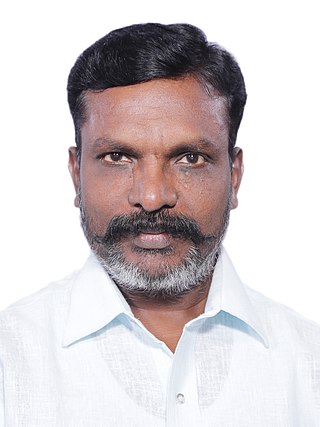
Tholkappiyan Thirumavalavan, better known as Thol. Thirumavalavan is a political leader, scholar and activist from the southern Indian state of Tamil Nadu. He is a Member of Parliament from Chidambaram. Leader and President of Viduthalai Chiruthaigal Katchi. He rose to prominence in the 1990s as a bahujan leader, and formally entered politics in 1999. His political platform centres on ending caste-based discrimination and consequently the caste system. He has also expressed support for Tamil nationalist movements in Sri Lanka.
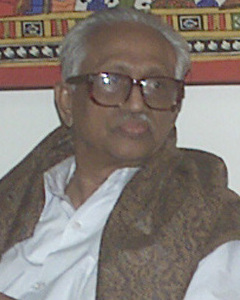
Kalyanasundaram Anbazhagan was an Indian politician. He was a long-standing leader of the Dravidian movement and was the General Secretary of Dravida Munnetra Kazhagam party (DMK) for nine terms. He has held several cabinet ministerial portfolios in the Tamil Nadu government under M. Karunanidhi including Finance, Education and Health and Social Welfare. He was elected as a member of the Tamil Nadu Legislative Assembly on nine occasions. He was earlier elected to the Lok Sabha the lower house of India's Parliament from Tiruchengode and was also a member of the Madras Legislative Council. He served as the opposition leader of Tamil Nadu assembly from 2001 to 2006. He was popularly referred to as Perasiriyar (Professor) as he was a lecturer in Tamil in Pachaiyappa's College before resigning to contest elections in 1957.
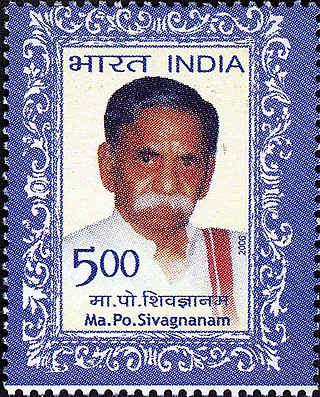
Mylai Ponnuswamy Sivagnanam, popularly known as Ma.Po.Si., was an Indian politician, freedom fighter, and the founder of the political party Tamil Arasu Kazhagam. He wrote more than 100 books.
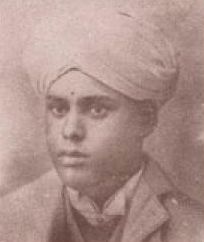
Parithimar Kalaignar, a Professor of Tamil at the Madras Christian College, was the first person to campaign for the recognition of Tamil as a classical language.
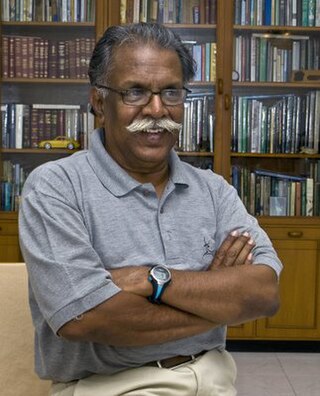
Sundararaj Theodore Baskaran is a film historian and wildlife conservationist from Tamil Nadu, India.

Apathsahayar Temple, Thirupazhanam is a Hindu temple dedicated to Shiva located in Thirupazhanam near Tiruvaiyaru, Tamil Nadu, India. The presiding deity is revered in the 7th century Tamil Saiva canonical work, the Tevaram, written by Tamil poet-saints known as the nayanars and classified as Paadal Petra Sthalam. The temple is counted as the earliest of all Chola temples.
Madurai Adheenam is the oldest Saivite adheenam, a form of Hindu monastery, in South India. It was established more than 1,300 years ago, and is said to have been rejuvenated by Thirugnana Sambandar. It is located near the Meenakshi Amman Temple in Madurai, Tamil Nadu, one of the most important Shiva–Shakti shrines. It is an active centre of Saiva Siddhanta philosophy.

The Maraimalai Adigal Bridge is a road bridge on Anna Salai connecting the northern and southern banks of the Adyar River.
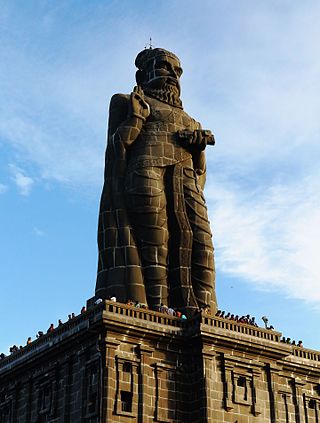
Valluvar year, also known as the Thiruvalluvar year, is an officially recognized Tamil calendar system for use in Tamil Nadu. It is calculated on the basis of the supposed year of birth of the Tamil poet-philosopher Valluvar. When comparing it with the widely used Gregorian calendar, Thiruvalluvar year will have an additional 31 years. For instance, the year 2024 in Gregorian calendar way is 2055 in the Thiruvalluvar year.